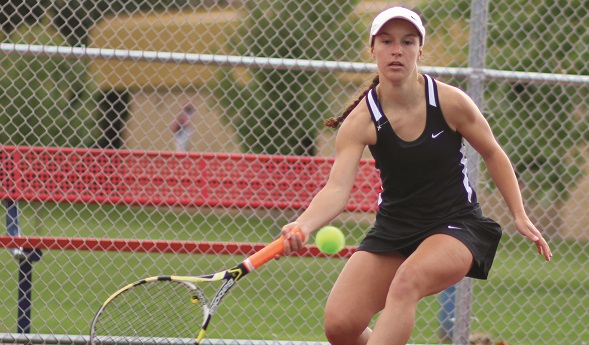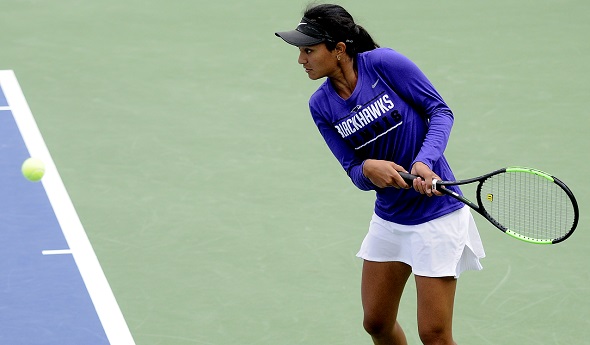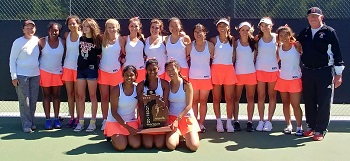
Westwood, Munising Star Shine Again
September 28, 2017
By Ryan Stieg
Special for Second Half
ISHPEMING – The Westwood girls tennis team has built a dynasty in the Upper Peninsula, and on Wednesday, it added another title to its trophy case.
It wasn’t easy though. After sharing the title with Munising last season, the Patriots had to hold off Iron River West Iron County at the end and edged the Wykons by one point at 17-16 for the Division 2 championship. Westwood has won eight of the last nine U.P. titles in its division.
“This was just a successful year,” Westwood head coach Chris Jackson said. “Heading into this year, we had to replace nine girls and we weren’t sure where we would be. I think most people thought this was going to be a rebuilding year, but we had some girls step up big for us.”
Munising took third at the meet with 10 points followed by Iron Mountain (8) and Ishpeming (5).
Westwood was led by its doubles teams as it won three of the four final matches including a three-set thriller by the tandem of Karlie Kargela and Karlie Patron at No. 1 (7-5, 4-6, 6-4). The Patriots also had two-set wins at both No. 3 with Hailey Mattila and Katelyn Anttila and No. 4 with Ellie Miller and Kaylee Larmour, while West Iron’s Emily Nelson and Avery Bosiek took the No. 2 match.
For West Iron County, it was a disappointing day as the Wykons were in six of the final eight matches but only picked up two victories. West Iron was in a similar situation last season and head coach Joe Serbentas said his team was determined to make up for that this year. However, it just wasn’t meant to be.
“We were disappointed last year, so the girls worked really hard to get back here and they wanted it badly,” Serbentas said. “I thought we really put ourselves in a good spot with seeds today to come out and win.”
On the singles side of the court, it was Munising’s time to shine. The Mustangs won the Nos. 1 and 2 matches thanks to strong performances by the Ackerman sisters, Marissa and Kelsea. Marissa won the No. 1 match over West Iron’s Katarina Serbentas, and Kelsea defeated Iron Mountain’s Jordan Stoner in the No. 2 competition. Marissa hasn’t lost a match in three years.
 “Our singles have been the strength of our lineup all year,” Munising head coach Rod Gendron said. “Unfortunately, we didn’t have enough depth today with doubles to win the title, but I’m very proud of how the girls competed. They’ve had some tough matches and on days like this, people are playing their best, so it’s not easy to win.”
“Our singles have been the strength of our lineup all year,” Munising head coach Rod Gendron said. “Unfortunately, we didn’t have enough depth today with doubles to win the title, but I’m very proud of how the girls competed. They’ve had some tough matches and on days like this, people are playing their best, so it’s not easy to win.”
Gendron also praised both Ackerman girls and explained how even though they may be related, their styles are completely different on the court.
“They both have a lot of experience and they both have been U.P. champs, so they know what it takes,” he said. “They do not give up no matter what the score is. They keep fighting and they make you earn everything. Marissa is a little more competitive, while Kelsea has nicer strokes. Marissa will do anything to win like throwing lobs or ugly shots while Kelsea is a more classic style player with good strokes and a strong serve. That’s the big difference between the two.”
Westwood and West Iron split the other two matches. West Iron’s Izzy Hoogenboom won the No. 3 match over Munising’s Kennedy Tate, while Westwood’s Tessa Leece took the No. 4 match over West Iron’s Anna Malmquist.
“Tessa hasn’t gotten a lot of publicity this year, and that’s hard as a No. 4 because everyone wants to talk about the No. 1s,” Jackson said. “I don’t know if I’ve ever seen anybody as composed as Tessa. No matter what the scenario, she maintains her composure, competes at a high level and learns from her mistakes.”
Ishpeming’s lone appearance in the finals was at No. 3 doubles where Audrey Stetson and MaKenzie VanBuren fell to Mattila and Anttila. Even though it wasn’t the day they were hoping for, Hematites head coach Erl Langness saw some positives in his team’s performance.
“We won the spots where we had seeds,” he said. “Madison Pruett had an excellent match against the girl from Munising (Marissa Ackerman) and our No. 1 doubles also had a good day. They lost to West Iron in three sets. It was a pretty good day. We would’ve like to do better, but we did okay. I think we’ve made a lot of progress since the beginning of the year.”
In the end though, the day belonged to Westwood. And even though the outcome came down to the wire, Jackson liked it that things turned out that way.
“Close matches like these make the tournament fun,” he said. “It came down to how the finals went, and that’s how it should be.”
PHOTOS: (Top) Munising's Marissa Ackerman returns a volley during a No. 1 singles match Wednesday at the U.P. Division 2 Finals. (Middle) Westwood's Karlie Kargela returns a shot at No. 1 doubles. (Photos by Rachel Oakley.)

Redemption Reigns for D1 Champions
June 2, 2018
By John Walker
Special for Second Half
MIDLAND — Bloomfield Hills junior Tia Mukherjee got redemption, while the Northville girls tennis team eked out another title Saturday at the Lower Peninsula Division 1 Finals at the Greater Midland Tennis Center.
Mukherjee dominated for a 6-0, 6-0 win over Northville senior Shanoli Kumar in the championship match at No. 1 singles. Mukherjee lost 6-0, 6-0 last year in the finals to Ann Arbor Pioneer’s Kari Miller, and said that was motivation.
“It feels great after last year,” Mukherjee said. “That was tough. I didn’t want that to happen again. I was more prepared.
“I improved my fitness and my forehand. I did a lot of off-court conditioning. I didn’t have enough energy going into the finals last year.”
Bloomfield Hills coach Chris Dobson agreed.
“Her fitness level is better,” he said. “Plus another year of maturity, poise and confidence. It makes a difference. She was highly motivated coming in.”
“At the end of the day, Tia was amazing,” Northville coach Linda Jones said.
“I thought she is the best player in the state,” Dobson said, “and she proved it. She played her best match and earned it.”
Northville had to earn its title, too, edging Midland Dow 32-30. Bloomfield Hills was third with 28 points.
The Mustangs shared last year’s title with Dow. Dow won the 2016 title. Northville won in 2015. The two were at it again in 2018.
Northville entered Saturday with 24 points and eight players in the semifinals for the first time in school history. Dow had 23 points with seven players, as did Bloomfield Hills.
Northville won key semifinals matches against Dow at No. 2 and No. 3 singles and advanced six to the finals. Dow advanced five, while Bloomfield Hills advanced three and dropped from contention.
 In the finals, Northville and Dow faced off at Nos. 1, 3 and 4 doubles. Dow got the first victory, at No. 3 doubles, and briefly tied the score with a win at No. 2 doubles. But Northville prevailed in the other head-to-head matches, clinching the crown with the win at No. 4 doubles.
In the finals, Northville and Dow faced off at Nos. 1, 3 and 4 doubles. Dow got the first victory, at No. 3 doubles, and briefly tied the score with a win at No. 2 doubles. But Northville prevailed in the other head-to-head matches, clinching the crown with the win at No. 4 doubles.
“It’s so sweet,” Northville’s Jones said. “This year we lost three important seniors and were seeded No. 2 all season behind Dow. We came in as underdogs. The girls just played over their levels. It’s the most satisfying (title). Three-time state champs is not too bad.”
“Absolutely there’s disappointment,” Dow coach Garrett Turner said, “which is a good thing, I guess. It means we’re doing the right things. We win one of those matches and the nerves are shifted to them. It’s hard to be upset with a second-place finish. We had our chances.”
At No. 2 singles, Ann Arbor Huron junior Miriam Gandam, the No. 1 seed, defeated Northville sophomore Tori Mady, the No. 2 seed, 2-6, 6-0, 6-1. Mady, the 2017 champ at No. 4 singles, got a key semifinals win over Dow’s Zoe Angell, 7-6 (3), 6-1.
At No. 3 singles, Ann Arbor Skyline senior Caroline Cartwright, the No. 2 seed, defeated Northville junior Renee Torres, the No. 4 seed, 6-3, 6-2. Torres, the returning champ at No. 3 singles, upset Dow’s Sarah Ismail, the No. 1 seed and returning champ at No. 2 singles, in a key semifinal match, 6-3, 6-4.
At. No. 4 singles, Jenna Silverman, the No. 1 seed, rallied past Dow senior Hadley Camp, 3-6, 6-4, 7-6 (1) in a 2-hour, 57-minute match. Silverman also rallied for a 4-6, 6-4, 6-2 win in the semifinals over Northville’s Maya Mulchanandani. Camp was the Finals runner-up for the third straight year.
At No. 1 doubles, Northville senior Serena Wang and junior Sophie Zhuang, the No. 1 seed, defeated Dow seniors Tatum Matthews and Kelly Livingston, the No. 2 seed, 6-1, 6-4.
At No. 2 doubles, Dow junior Meghan Killmaster and sophomore Victoria Leiti, the No. 3 seed, defeated Bloomfield Hills senior Alandria Bellamy and sophomore Kaela Bernard, the No. 4 seed, 6-2, 6-2.
At No. 3 doubles, Dow seniors Giacomina Fabiano and Christina Vanderkelen, the No. 3 seed, defeated Northville junior Madison DeYoung and freshman Michelle Tong, the No. 4 seed, 6-2, 6-3.
At No. 4 doubles, Northville junior Connie Gao and freshman Sneha Ganan, the No. 2 seed, defeated Dow juniors Amelie Kraef and Reema Patel, the No. 1 seed, 6-4, 7-6 (1). Kraef and Patel came into Saturday without losing a set all season but had to rally for a 5-7, 6-1, 7-5 win in the semifinals.
PHOTOS: (Top) Bloomfield Hills' Tia Mukherjee prepares to return a shot during her No. 1 singles match Saturday. (Middle) Northville poses with its latest MHSAA Finals trophy. (Click to see more from HighSchoolSportsScene.com.)

